The OnePlus 10 Pro is without doubt the best phone the company has ever made. From its powerful processor and its beautiful display, to its solid camera and smart design, it ticks pretty much every box you should expect from a high-end flagship Android phone in 2022. And at $899 (£799, roughly AU$1,400), the phone is competitively priced against high-end rivals like the Galaxy S22 Ultra ($1,200) and iPhone 13 Pro ($999).
It offers similar performance, 5G and a smooth, approachable interface. However, it’s let down slightly by mediocre low-light camera performance, a lack of an official IP water resistance rating on most versions of the phone and a few omissions when it comes to the US models.
Post Contents
Like
- Classy design
- Powerful performance
- All-day battery life
- Vibrant screen
Don’t Like
- Slightly disappointing camera
- Waterproof rating restricted to T-Mobile-exclusive models
- No 80-watt fast charging in the US
But even with those relatively minor issues, the OnePlus 10 Pro offers a lot for the money and is well worth considering if you’re looking for a high-performance Android phone that leaves a little cash left in your pocket.
Classy design, glorious display, problematic waterproofing
I love the look of the 10 Pro. It’s got a frosted glass back, with an attractive camera unit and a lovely green color that I think is smarter and more stylish than the shiny fingerprint-prone backs of the previous OnePlus 9 and 9 Pro. It has a look that I think stands out well against the likes of the iPhone or S22 Ultra.
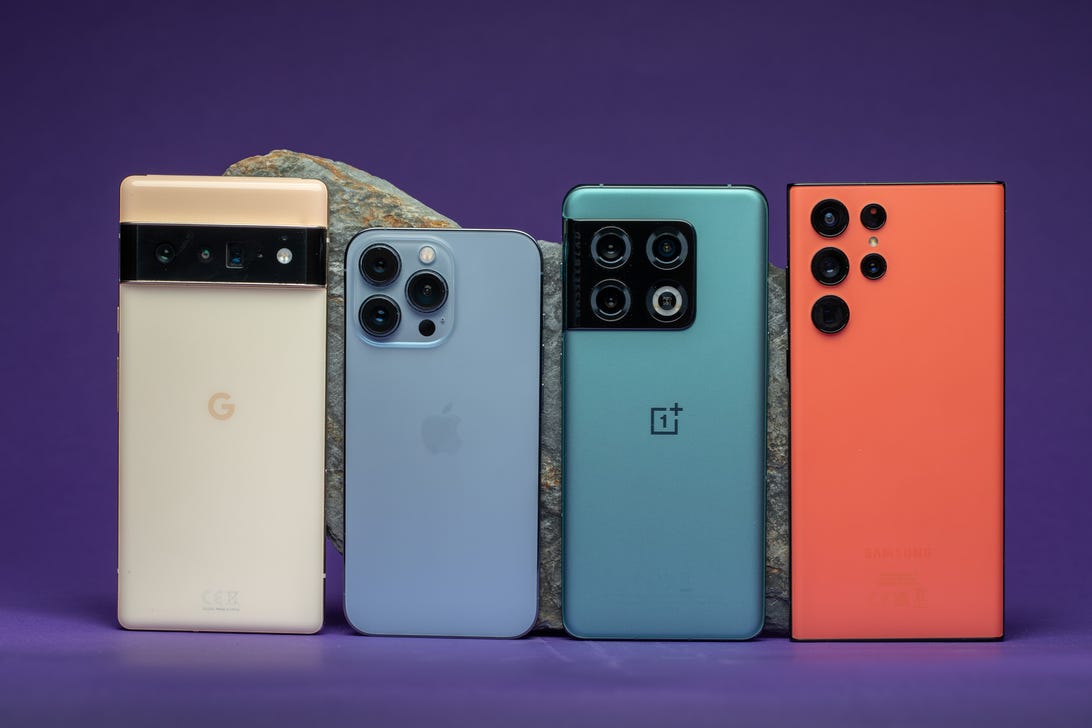
Andrew Lanxon/CNET
It should put up with some abuse too, as the back is made from toughened Gorilla Glass 5 and there’s even more hardcore Gorilla Glass Victus covering the front. There’s no official waterproofing though, unless you buy the T-Mobile exclusive version in the US which does have an IP68 rating. The rest of you — including everyone outside of the US — will simply have to keep it extra safe from spilled drinks.
OnePlus has partnered with T-Mobile for the phone’s US launch, with the carrier selling the phone as well as allowing full 5G support for customers who bring an unlocked model. The phone won’t support 5G when used on AT&T, but you can bring it to the carrier to use just on its 4G network. The OnePlus 10 Pro will also work on Verizon’s 5G network, but you’ll have to buy it unlocked before setting it up with the carrier.
Waterproofing being a T-Mobile exclusive is a shame, as it’s pretty standard on many of its rivals, including the iPhone 13 Pro, S22 Ultra and Pixel 6 Pro. The previous OnePlus 9 Pro was also IP68-rated, so it feels especially disappointing that this useful safety feature has been restricted solely as part of an exclusivity agreement with one US carrier.
The 6.7-inch display has a 3,216×1,440-pixel maximum resolution, making even tiny little details look pin sharp. It’s bright, too, with punchy colors that do justice to colorful games like Candy Crush and Alto’s Odyssey or vibrant TV shows like Squid Game or even Bluey.
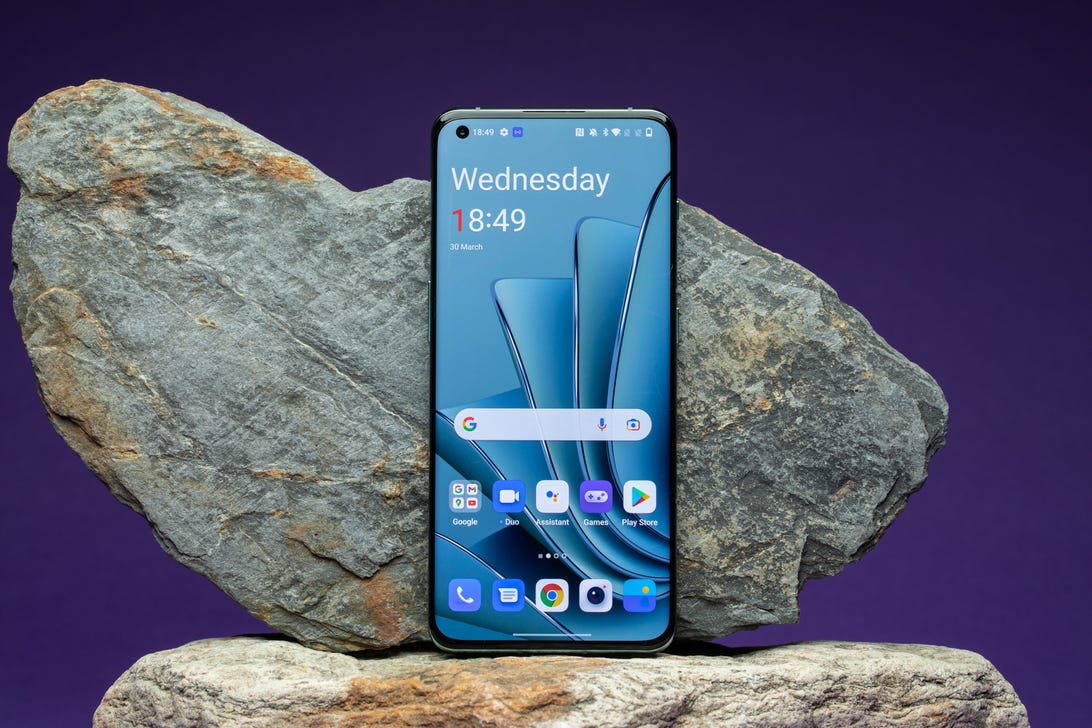
The screen has a 120Hz refresh rate which makes it seem buttery smooth when scrolling around, but it can automatically switch to lower rates in less demanding tasks in order to conserve battery. You’ll also find a fingerprint scanner invisibly hidden beneath the display which works quickly and accurately most of the time.
Three great cameras that need to try harder
The back of the phone is home to three cameras; a 48-megapixel main camera, a 50-megapixel ultrawide camera and an 8-megapixel telephoto camera offering 3.3x optical zoom.
I’ve spent some time already using the main camera in an earlier test and I’m pleased to report that results are generally excellent, with accurate colors, a great balance of exposure and plenty of detail. There’s a new raw file option too — called Raw Plus — hidden in the Pro camera mode which uses computational techniques including HDR blending but still outputs a DNG raw file for easier editing. It’s similar to what Apple does with its ProRaw mode and it works well here if you’re the sort of person who likes editing your images later on.

Andrew Lanxon/CNET

Andrew Lanxon/CNET

Andrew Lanxon/CNET
It has a portrait mode which does a good job of separating your subject from the blurred background, along with neat features like a panoramic-style mode called XPAN (harking back to old Hasselblad cameras) for wide and narrow images and a motion blur mode for creating blurred water effects or car headlights streaking through a night-time street scene.

Katie Collins/CNET

Andrew Lanxon/CNET
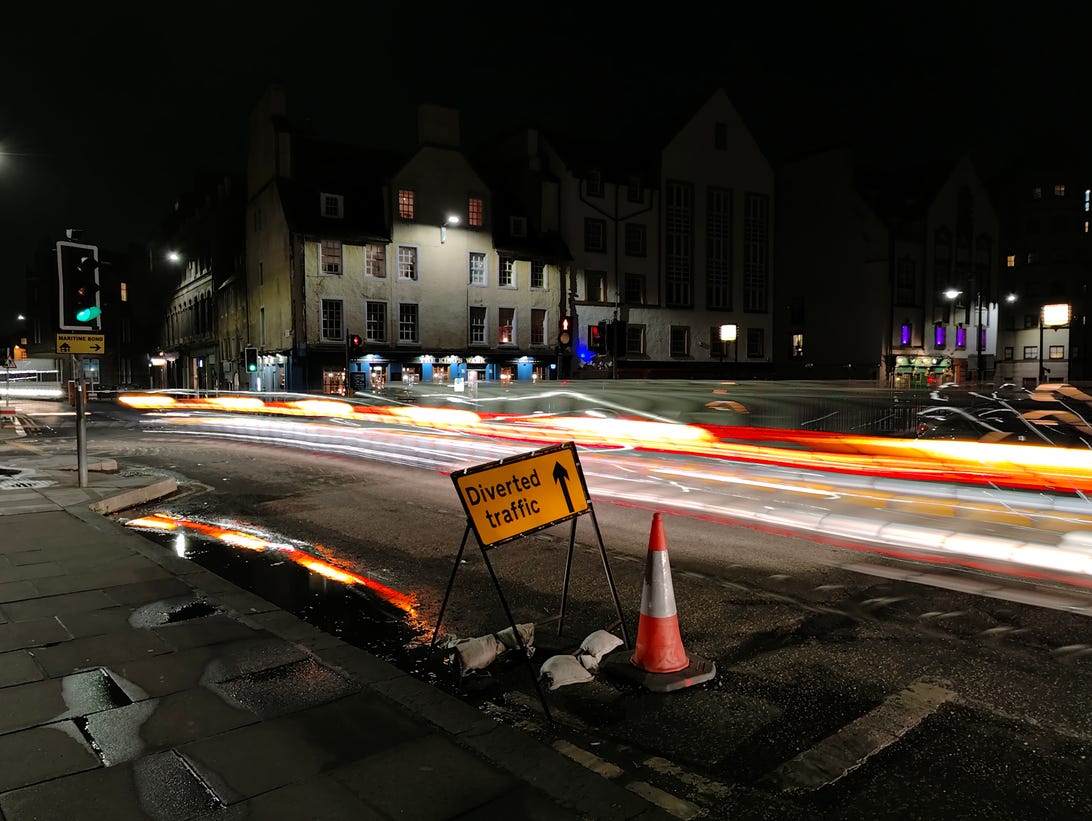
Andrew Lanxon/CNET
The super wide lens is vibrant and sharp too, although there’s sometimes a noticeable color shift between the normal and wide modes, while the optical zoom lens gives enough zoom to help you find more interesting compositions in your surroundings. It too is reasonably sharp, although I’ve found the iPhone’s zoom produces clearer results. Of course if zoom is a priority for you, no phone comes close to the whopping 10x optical zoom offered by the Galaxy S22 Ultra.

Andrew Lanxon/CNET
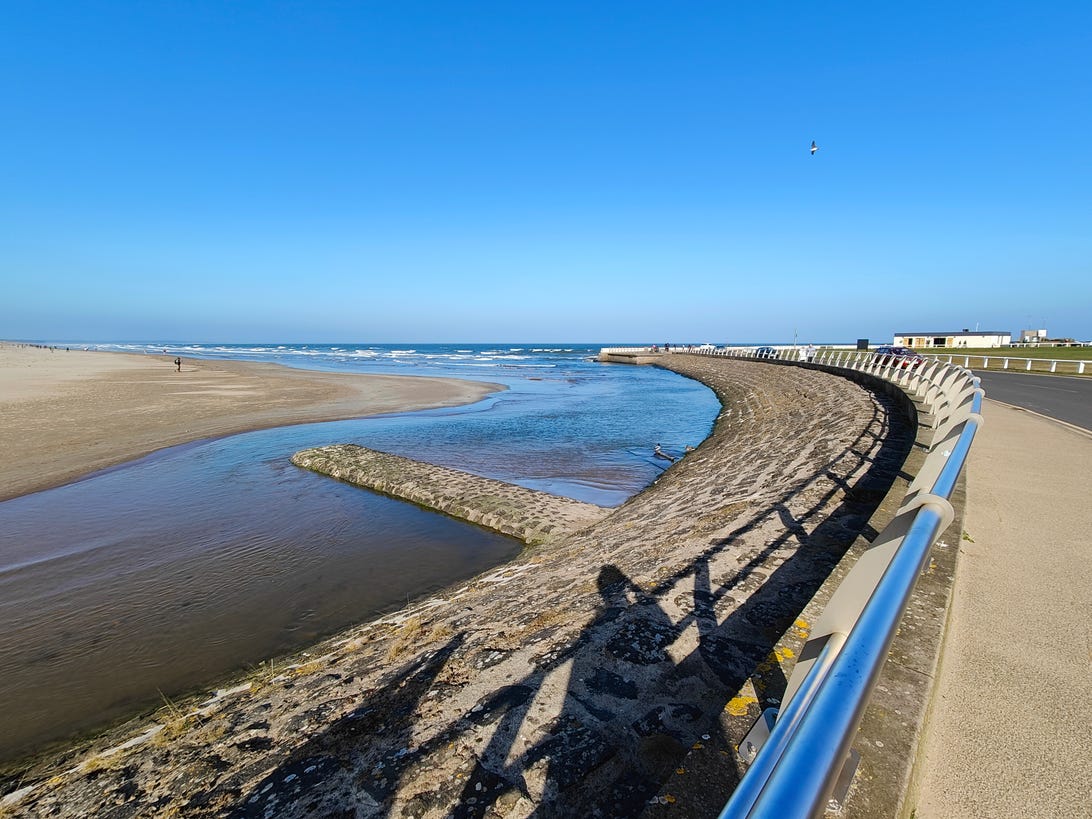
Andrew Lanxon/CNET

Andrew Lanxon/CNET

Andrew Lanxon/CNET
Then there’s the 32-megapixel front-facing camera, which consistently produces vibrant and sharp images that’s perfect for the selfie obsessed among you.

Andrew Lanxon/CNET

Andrew Lanxon/CNET
When the sun goes down, the night mode does a decent job of creating bright and sharp images from the main lens but results still aren’t quite up there with the iPhone. Especially not when you switch to the zoom lens, which struggled at night, resulting in a noisy, blurry shot that was world’s apart from the iPhone’s effort in the same scene.

Andrew Lanxon/CNET

Andrew Lanxon/CNET

Andrew Lanxon/CNET

Andrew Lanxon/CNET

Andrew Lanxon/CNET

Andrew Lanxon/CNET
OnePlus cameras have always been decent, but they’ve typically not done enough to compete with the best phones around. And while the 10 Pro packs the best camera OnePlus has ever put into a phone, it lets itself down a little with both its night mode and zoom skills. Its main camera is excellent for most daytime scenes, however, and it’ll serve you well if photography is important but maybe not the sole reason you’re buying a phone.
Supercharged processor, powerful battery
Powering the phone is Qualcomm’s latest Snapdragon 8 Gen 1 processor, along with 12GB of RAM on my UK review model, although US versions will have a maximum of 8GB. This combo put in some great scores in our various benchmark tests. It’s certainly up there among its rivals and there’s no doubt that it’s capable of handling any of the everyday tasks you’d want to throw at it.
OnePlus 10 Pro performance chart
Legend:
Geekbench 5 (multi-core)
3DMark Slingshot Unlimited
Note:
Longer bars equals better performance
It breezed through things like raw photo editing and video streaming and demanding games like Asphalt 9 or PUBG played beautifully smoothly even with the settings cranked to the max. OnePlus has apparently done a variety of tweaks to ensure that gaming performance is optimized for smooth frame rates along with reducing the latency between you tapping the screen and an action taking place. Mobile gamers are well catered for here.
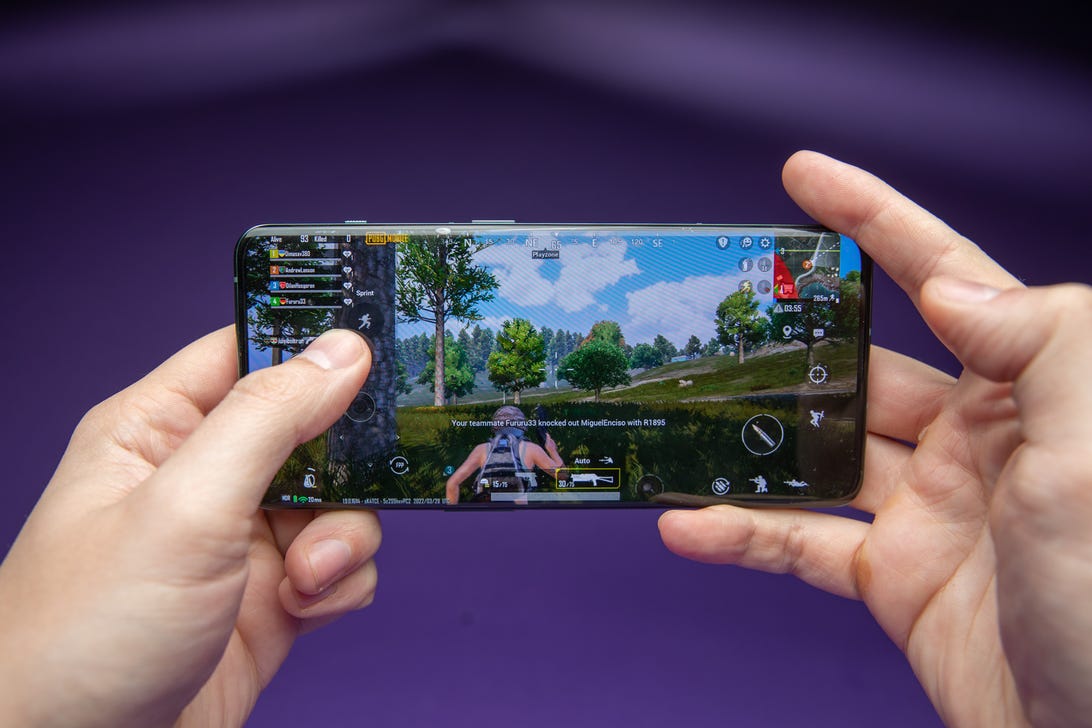
Andrew Lanxon/CNET
Interestingly there’s an option in the settings to expand the available RAM up to a whopping 19GB (as reviewed) by using some of the regular storage. However, I didn’t notice any real improvement in performance when doing this (and no change in benchmark results). Whether you’ll find this genuinely useful when using lots of apps at once remains to be seen.
The Android 12-based software, running the latest version of Oxygen OS, is neat and free of general clutter making it a good option for both experienced Android users or those taking their first steps into the Android world.
Providing the juice is a capacious 5,000-mAh battery, which thanks to the various performance improvements will comfortably allow for a full day of mixed use. During my testing, I found that after an hour of YouTube streaming with the screen on max brightness it had dropped from full to only 99%, dropping to 94% after a second hour which is better than I’d found from both the Pixel 6 Pro and iPhone 13 Pro.
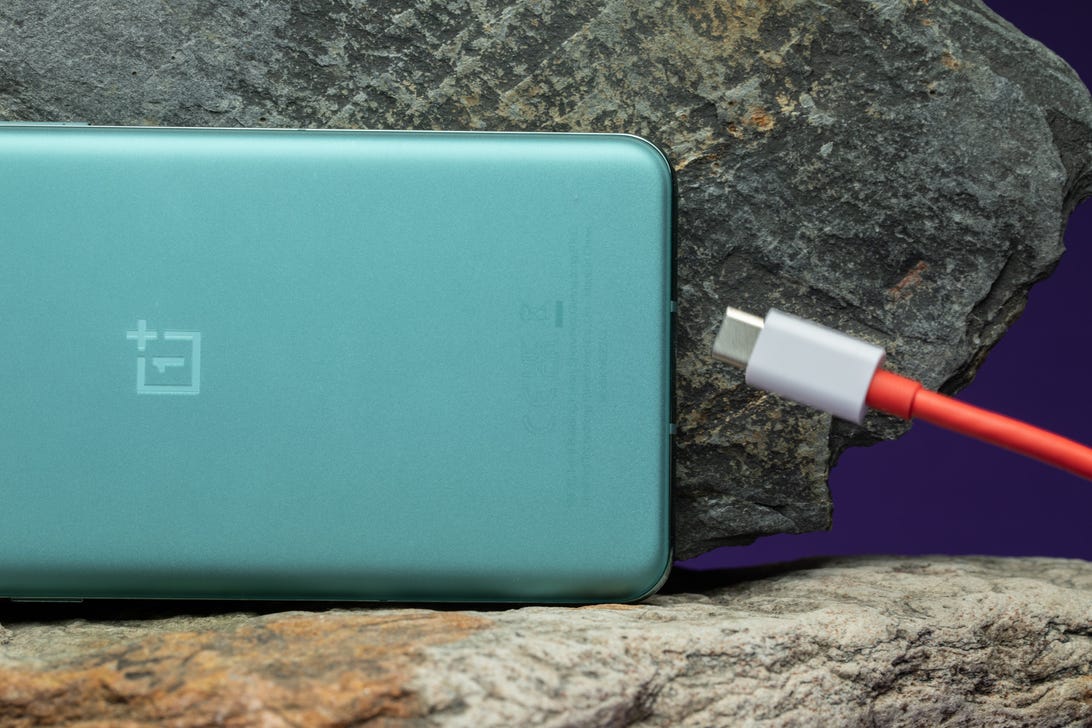
Andrew Lanxon/CNET
It supports fast charging too; my UK review model being able to suck down the juice at 80W, although in the US its peak fast charging is done at 65W which OnePlus says will take it from empty to full in a little over 30 minutes. That’s still incredibly fast and allows you to give it a quick boost if needed before you head out for the evening, safe in the knowledge you’ll have enough battery to call a cab home after a few beers.
A Pixel 6 Pro Rival
The OnePlus 10 Pro may have the S22 Ultra and the iPhone 13 Pro in its sights, but the closest competitor the phone has may be the Pixel 6 Pro that’s also at $899 in the US. The OnePlus 10 Pro makes use of the newest Qualcomm chip, while the 6 Pro is powered by Google’s in-house Tensor chip. Both provide fast speeds and show off the best of Android 12.
Yet due to features that are exclusive to T-Mobile, especially water resistance, many people might be better off with the Pixel simply for its wider compatibility. Internationally, however, the OnePlus 10 Pro stands on slightly more even ground and can surpass thanks to its ludicrously fast wired charging speeds and, for the UK, the 10 Pro is cheaper at £799 than the 6 Pro at £849.
OnePlus 10 Pro is a Competitively Priced High-End Phone with 2022’s Best Specs
OnePlus 10 Pro specs comparison
| OnePlus 10 Pro | Galaxy S22 Ultra | iPhone 13 Pro | Google Pixel 6 Pro | |
|---|---|---|---|---|
| Display size, resolution | 6.7-inch; 3,216×1,440 pixels | 6.8-inch AMOLED; 3,088×1,440 pixels | 6.1-inch LTPO OLED; 2,532×1,170 pixels, 10-120Hz refresh rate | 6.7-inch LTPO OLED; 3,120×1,440 pixels; 10-120Hz |
| Pixel density | 525ppi | TBC | 460 ppi | 512 ppi |
| Dimensions (Millimeters) | 163 x 74 x 8.6 mm | 163 x 78 x 8.9 mm | 147 x 72 x 7.7 mm | 164 x 76 x 8.9 mm |
| Weight (Ounces, Grams) | 201g | 229 g | 7.19 oz; 204g | 7.41 oz; 210g |
| Mobile software | Android 12 | Android 12 | iOS 15 | Android 12 |
| Camera | 48-megapixel (wide), 50-megapixel (ultrawide), 8-megapixel (telephoto) | 108-megapixel (wide), 12-megapixel (ultrawide) 10-megapixel (telephoto) 10-megapixel (telephoto) | 12-megapixel (wide), 12-megapixel (ultrawide), 12-megapixel (telephoto) | 50-megapixel (wide), 12-megapixel 9ultrawide), 48-megapixel (telephoto) |
| Front-facing camera | 32-megapixel | 40-megapixel | 12-megapixel | 11-megpixel |
| Video capture | 4K at 60 fps | 4K | HDR video recording with Dolby Vision up to 4K at 60 fps; ProRes video recording up to 4K at 30 fps (1080p at 30 fps for 128GB storage)* | 4K 30, 60fps (rear), 4K 30fps (front) |
| Processor | Snapdragon 8 gen 1 | Snapdragon 8 gen 1 | Apple A15 Bionic | Google Tensor |
| RAM/Storage | 8/128GB (US) 12/256GB (UK) | 8GB + 128GB ; 12GB + 256GB; 12GB+512GB; 12GB+ 1TB | 128GB, 256GB, 512GB, 1TB | 128GB, 256GB, 512GB |
| Expandable storage | None | None | No | No |
| Battery/Charger | 5,000 mAh (65W bundled charger) | 5,000 mAH (45W wired charger) | Undisclosed; Apple lists 22 hours of video playback | 5,003 mAh |
| Fingerprint sensor | In-display | In-display | No (Face ID) | Under display |
| Connector | USB-C | USB-C | Lightning | USB-C |
| Headphone jack | None | No | No | No |
| Special features | 5G, 120Hz display, 65W fast charging (80W in the UK), IP68 water resistance (on T-Mobile variants only) | 5G (mmw/Sub6), bundled S Pen, 100x Space Zoom (digital), 10x optical zoom, 47 W charging support | ProMotion technology with adaptive refresh rates up to 120Hz; lidar scanner; 5G enabled; MagSafe; water resistant (IP68); wireless charging; dual-SIM capabilities (nano-SIM and e-SIM) | 5G sub 6 and mmWave support, Wi-Fi 6E, Ultrawideband, 30W fast charging, Magic Eraser, Motion mode, Real Tone, Face Unblur, Cinematic Pan, 5 years OS and security updates, IP68 rating for dust and water resistance, Gorrila Glass Victus (front and back) |
| Price off-contract (USD) | $899 | $1,200 | $999 (128GB), $1,099 (256GB), $1,299 (512GB), $1,499 (1TB) | $899 (128GB) |
| Price (GBP) | £799 | £949 (128GB), £1,049 (256GB), £1,249 (512GB), £1,449 (1TB) | £849 | |
| Price (AUD) | TBA | AU$1,699 (128GB), AU$1,869 (256GB), AU$2,219 (512GB), AU$2,569 (1TB) |